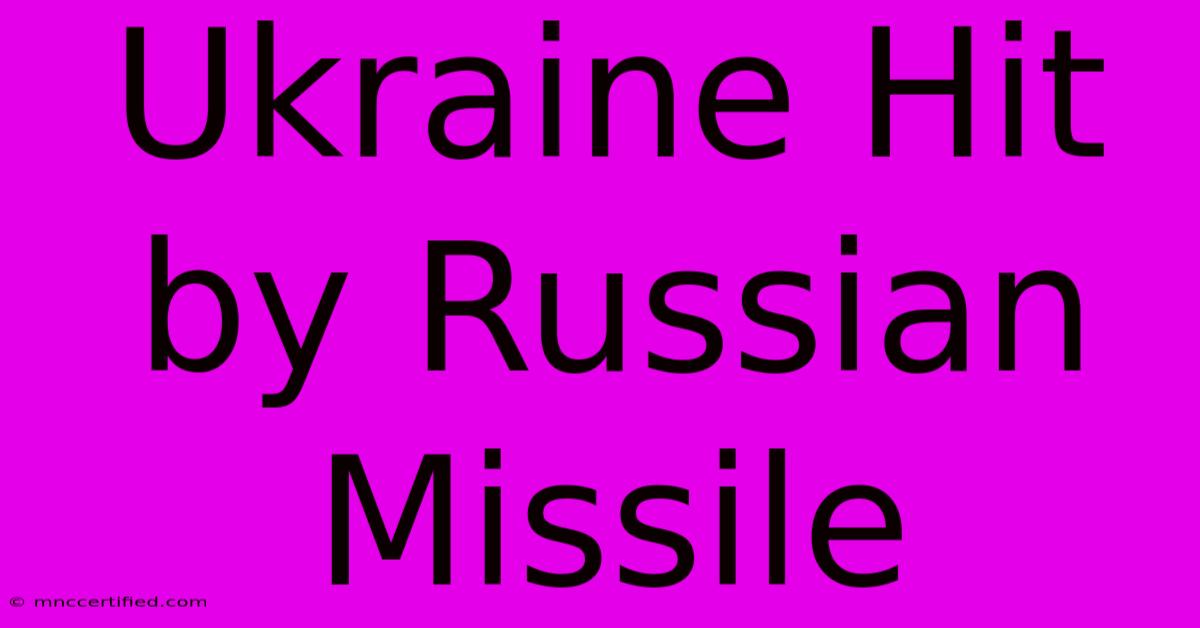Ukraine Hit By Russian Missile

Table of Contents
Ukraine Hit by Russian Missile: A Deep Dive into the Ongoing Conflict
The ongoing conflict between Russia and Ukraine has resulted in countless devastating attacks, with civilian populations bearing the brunt of the violence. Recent events involving Russian missiles striking Ukraine demand a thorough examination of the situation, its implications, and the international response. This article will delve into the details of these attacks, exploring the human cost, geopolitical consequences, and the ongoing humanitarian crisis.
Understanding the Recent Attacks
Reports of Russian missile strikes on Ukrainian cities and infrastructure are unfortunately commonplace. These attacks, often targeting civilian areas, have caused widespread destruction, casualties, and displacement. Specific details about the location, timing, and targets of each attack vary depending on the source and the constantly evolving nature of the conflict. Reliable news sources, such as those verified by international organizations like the UN, should be consulted for the most accurate and up-to-date information.
Types of Missiles Used
The types of missiles employed by Russia in these attacks are crucial to understanding their destructive capabilities. While specific details are often withheld for security reasons, reports frequently mention various missile systems, including:
- Cruise missiles: These missiles have a longer range and can be launched from land, sea, or air, making them a significant threat.
- Ballistic missiles: Characterized by a high trajectory, ballistic missiles can be difficult to intercept and cause widespread damage.
- Other ordnance: The conflict also involves the use of other forms of ordnance, including artillery shells and rockets, which also inflict significant damage.
The Human Cost: Casualties and Displacement
The human cost of these attacks is immeasurable. Each missile strike results in loss of life, injuries, and widespread trauma. Civilian casualties are a particular concern, highlighting the indiscriminate nature of some attacks. The displacement of populations due to these attacks further exacerbates the humanitarian crisis. Millions of Ukrainians have been forced to flee their homes, seeking refuge within Ukraine or in neighboring countries.
Long-Term Impacts on Mental Health
Beyond the immediate physical toll, these attacks leave long-lasting psychological scars. The trauma experienced by survivors can have profound and lasting effects on their mental health, requiring extensive support and rehabilitation. Addressing the mental health needs of those affected is crucial for long-term recovery.
Geopolitical Ramifications and International Response
The ongoing missile strikes have significant geopolitical consequences, intensifying tensions between Russia and the West. International condemnation of these attacks is widespread, with many countries imposing sanctions on Russia and providing humanitarian and military aid to Ukraine. However, finding a lasting solution to the conflict remains a major challenge.
International Efforts for Peace
Various international organizations and world leaders are actively involved in mediating peace talks and providing humanitarian assistance. The efforts to negotiate a ceasefire and achieve lasting peace are complex and ongoing. The effectiveness of these efforts depends on the willingness of all parties involved to engage in constructive dialogue.
Conclusion: The Urgent Need for Action
The continuing attacks on Ukraine using Russian missiles underscore the urgent need for a peaceful resolution to the conflict. The human cost, geopolitical implications, and humanitarian crisis demand immediate action from the international community. Continued monitoring of the situation, accurate reporting, and international pressure are crucial to ensuring accountability and preventing further suffering. Supporting humanitarian aid efforts and advocating for a peaceful resolution remain vital steps in addressing this ongoing tragedy.
Keywords: Ukraine, Russia, missile strike, conflict, casualties, humanitarian crisis, geopolitical implications, international response, sanctions, ceasefire, peace talks, civilian casualties, missile types, cruise missile, ballistic missile, displacement, mental health, trauma, humanitarian aid.

Thank you for visiting our website wich cover about Ukraine Hit By Russian Missile. We hope the information provided has been useful to you. Feel free to contact us if you have any questions or need further assistance. See you next time and dont miss to bookmark.
Featured Posts
-
Aaa Car Insurance Vs Progressive
Nov 21, 2024
-
Laken Riley Murder All Counts Guilty
Nov 21, 2024
-
Shaboozey Sings Highway And A Bar Song
Nov 21, 2024
-
24 04 An Hour Is How Much A Year
Nov 21, 2024
-
Russia Ukraine Conflict Icbm Launch Scrutiny
Nov 21, 2024